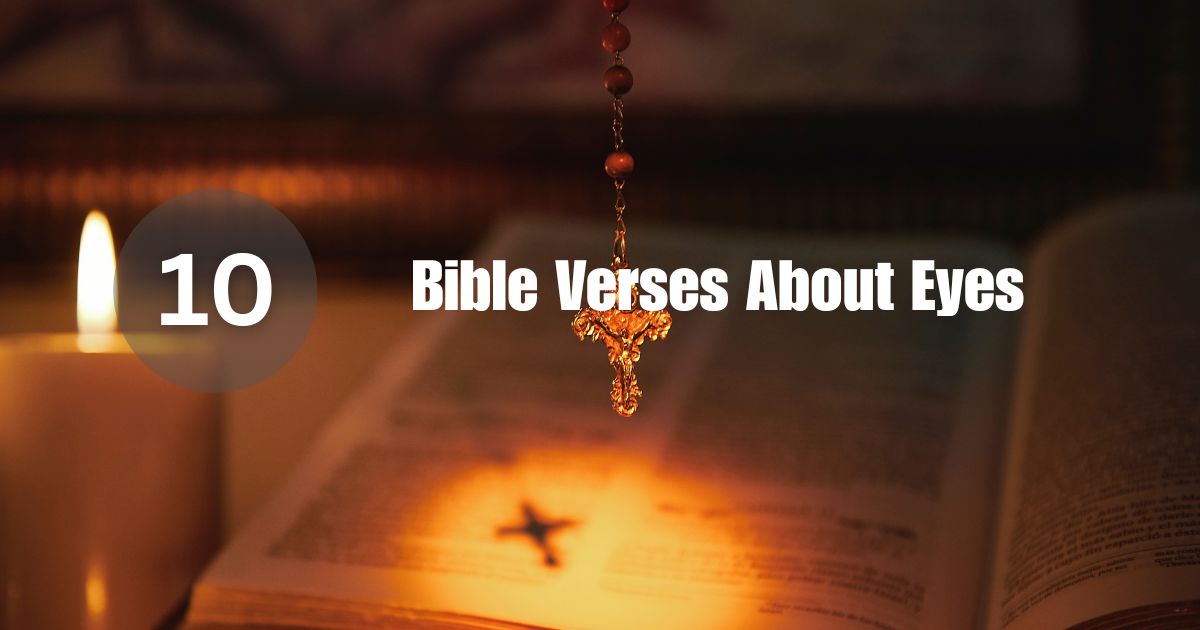Have you ever considered the profound power of your sight? Our eyes are not just windows to the world, but in the Bible, they are powerful metaphors for our spiritual perception, moral choices, and connection to God. From the temptation in the Garden of Eden to the promise of a future where every tear is wiped away, Scripture is filled with references to eyes that guide, warn, and comfort us.
This comprehensive guide goes beyond a simple list. We have categorized key Bible verses about eyes, providing context to understand their original meaning and offering practical applications to help you integrate their wisdom into your daily walk of faith. Let’s explore what the Bible says about seeing the world—and God—rightly.
What Does the Bible Say About Eyes? A Summary Table
For a quick overview, here are the primary themes the Bible addresses concerning eyes, along with a key verse for each.
| Theme | Key Verse | Quick Summary |
| Spiritual Sight | Matthew 6:22-23 | Your spiritual health determines your perception of the world. |
| God’s Watchful Care | 2 Chronicles 16:9 | God is actively looking to support those who are faithful to Him. |
| The Danger of Lust | Matthew 5:28 | Lustful looking is equated with the sin of adultery in the heart. |
| Prayer for Revelation | Psalm 119:18 | A prayer to understand the deeper truths in God’s Word. |
| Divine Protection | Zechariah 2:8 | God’s people are as precious and protected as the pupil of His eye. |
| Healing & Restoration | John 9:7 | Jesus has the power to open blind eyes, both physically and spiritually. |
| God’s Omniscience | Proverbs 15:3 | The eyes of the Lord are everywhere, seeing all good and evil. |
Bible Verses About Eyes, Categorized by Theme
For Spiritual Insight and Revelation
This theme deals with our ability to perceive spiritual truth and understand God’s will.
Matthew 6:22-23 (NIV)
“The eye is the lamp of the body. If your eyes are healthy, your whole body will be full of light. But if your eyes are unhealthy, your whole body will be full of darkness. If then the light within you is darkness, how great is that darkness!”
- Context: Part of Jesus’ Sermon on the Mount, this verse comes right after teachings on storing up treasures in heaven, not on earth. The “eye” here represents spiritual vision and focus.
- Meaning: A “healthy” (or generous) eye is one focused on God and His kingdom, filling a person with spiritual light. An “unhealthy” (or stingy) eye is one focused on worldly greed and darkness, leading to a life devoid of spiritual understanding.
- Application: Ask yourself: “Where is my primary focus? Am I investing more energy in temporal possessions or in my spiritual growth?” Choose to fix your gaze on Christ through prayer, worship, and studying Scripture.
Psalm 119:18 (NIV)
“Open my eyes that I may see wonderful things in your law.”
- Context: This is a verse from the longest chapter in the Bible, a beautiful psalm dedicated to the love and value of God’s Word and commandments (His “law”).
- Meaning: The psalmist acknowledges that understanding Scripture requires divine revelation. It’s a prayer asking God to remove spiritual blindness and reveal the depth, beauty, and wonder contained in His instructions.
- Application: Make this your prayer before you open your Bible. “God, open my eyes to see what you want to show me today. Let your Word come alive to me.” This posture invites the Holy Spirit to be your teacher.
Ephesians 1:18 (NIV)
“I pray that the eyes of your heart may be enlightened in order that you may know the hope to which he has called you, the riches of his glorious inheritance in his holy people.”
- Context: The Apostle Paul writes to the church in Ephesus, praying for their spiritual growth and understanding.
- Meaning: The “eyes of your heart” is a metaphor for the inner self—your mind, will, and understanding. Paul is praying for supernatural insight into the Christian’s sure hope, priceless value, and immense power available through Christ.
- Application: When you feel hopeless or uncertain, pray this over yourself. Ask God to enlighten the eyes of your heart so you can grasp the incredible future He has for you.
For God’s Omniscience and Care
These verses remind us that God sees everything—not from a place of judgmental scrutiny, but from a place of loving care and commitment to His people.
2 Chronicles 16:9 (NIV)
“For the eyes of the Lord range throughout the earth to strengthen those whose hearts are fully committed to him.”
- Context: A prophet named Hanani says this to King Asa of Judah after the king relied on a foreign army instead of God for protection.
- Meaning: God is not passive or distant. He is actively, constantly searching the earth. His purpose is not to find people failing, but to find those whose hearts are loyal to Him so He can show His strength on their behalf.
- Application: Be encouraged! God is looking for you. Your faithfulness, even in quiet obscurity, does not go unnoticed. He sees and is ready to support and strengthen you.
Proverbs 15:3 (NIV)
“The eyes of the Lord are everywhere, keeping watch on the wicked and the good.”
- Context: A proverb from Solomon emphasizing God’s omnipresence and omniscience.
- Meaning: Nothing is hidden from God’s sight. His awareness is comprehensive, encompassing both the actions of the righteous and the wicked. This is a warning to evildoers and a comfort to those doing good.
- Application: Live with integrity, knowing you live before the audience of One. Let this truth comfort you when you feel wronged or unseen; God sees the full picture and will bring justice and vindication in His time.
Zechariah 2:8 (NIV)
“For this is what the Lord Almighty says: ‘After the Glorious One has sent me against the nations that have plundered you—for whoever touches you touches the apple of his eye.'”
- Context: The prophet Zechariah brings a message of hope and restoration to Jerusalem after the exile.
- Meaning: The “apple of the eye” refers to the pupil—the most sensitive and protected part of the eye. This is a powerful metaphor for how God feels about His people. To harm them is to poke the pupil of God’s eye; it triggers His deepest protective instincts.
- Application: Internalize your immense value to God. You are not just one in a billion; you are the apple of His eye. He is fiercely protective and deeply caring towards you.
Find Out More : 50 Powerful Bible Verses About Strength
Warnings Against Temptation and Lust
The Bible is brutally honest about the power of visual temptation and the importance of guarding what we look at.
Matthew 5:28 (NIV)
“But I tell you that anyone who looks at a woman lustfully has already committed adultery with her in his heart.”
- Context: Jesus is explaining the true, heart-level intent behind the Old Testament law against adultery.
- Meaning: Sin begins in the heart and mind. Jesus raises the standard from mere external action to internal intention. The lustful look, the intentional feeding of desire for someone who is not your spouse, is identified as the root of the sin itself.
- Application: Guard your eyes. Be disciplined about what you watch and look at. Practice “bouncing” your eyes away from tempting images. Cultivate a heart of purity and honor towards others.
1 John 2:16 (NIV)
“For everything in the world—the lust of the flesh, the lust of the eyes, and the pride of life—comes not from the Father but from the world.”
- Context: The Apostle John describes the three categories of temptation that characterize the world’s system, standing in opposition to God.
- Meaning: The “lust of the eyes” is the craving for what we see—material possessions, covetousness, and sensual gratification. It’s a temptation based on visual enticement that leads to discontentment and sin.
- Application: Recognize this type of temptation for what it is. When you feel a strong craving for something you see, pause and ask: “Is this desire from God, or is it a ‘lust of the eyes’ leading me away from contentment in Christ?”
Job 31:1 (NIV)
“I made a covenant with my eyes not to look lustfully at a young woman.”
- Context: Job is defending his integrity, listing the ways he has pursued a blameless life, even in his thoughts.
- Meaning: Job understood that purity required a proactive, preemptive decision—a “covenant” or promise. He didn’t wait to be tempted; he set a boundary for his eyes beforehand.
- Application: Be like Job. Don’t be passive. Make a conscious decision, even a prayerful covenant with God, to guard what you allow your eyes to focus on. This is especially relevant in the digital age.
Prayers for Healing and Restoration
God is in the business of opening eyes, both physically and spiritually.
John 9:7 (NIV)
“‘Go,’ he told him, ‘wash in the Pool of Siloam’ (this word means ‘Sent’). So the man went and washed, and came home seeing.”
- Context: Jesus heals a man who was blind from birth. The healing process involved the man’s obedience to Jesus’ unusual instruction.
- Meaning: Jesus has the power to overcome any form of blindness. The obedience to “go and wash” was a step of faith that resulted in miraculous sight.
- Application: Bring your areas of “blindness”—whether physical illness, confusion about the future, or inability to understand a situation—to Jesus. Be willing to obey whatever He tells you to do, trusting in His power to heal and reveal.
Isaiah 35:5 (NIV)
“Then will the eyes of the blind be opened and the ears of the deaf unstopped.”
- Context: A prophetic word from Isaiah about the future restoration and healing that God will bring, a time of messianic blessing.
- Meaning: This prophecy looked forward to the ministry of Jesus (which fulfilled it, as seen in the Gospels) and also to the ultimate restoration of all things in the new heaven and new earth. It is a promise of God’s healing power.
- Application: Pray this verse over situations that need God’s restorative touch. It builds faith to declare God’s promises of healing and wholeness, trusting that He is still in the business of opening blind eyes today.
Frequently Asked Questions
What does “the eye is the lamp of the body” mean in Matthew 6:22? A:
This metaphor means that your spiritual vision determines the condition of your entire inner life. If your focus (“eye”) is clear and fixed on God and His truth, it brings light, clarity, and health to your entire being (your “body”). But if your focus is corrupted by greed, jealousy, or worldly values, it plunges your whole life into spiritual darkness and confusion.
What is the “lust of the eyes” that 1 John 2:16 talks about? A:
The “lust of the eyes” is not just sexual lust. It is a broader category of temptation that involves coveting or craving anything you see that is not rightfully yours. This can include lust for material possessions (a new car, a bigger house), envy of someone else’s life, or an unhealthy desire for sensual gratification through pornography or inappropriate media. It’s a temptation based solely on visual attraction that leads away from contentment in God.
What does “apple of my eye” mean in the Bible? A:
This phrase (found in Deuteronomy 32:10, Psalm 17:8, and Zechariah 2:8) refers to the pupil of the eye. Because the pupil is incredibly sensitive and vital for sight, it is instinctively protected. When God calls someone the “apple of his eye,” it means they are exquisitely precious to Him, He is deeply attentive to them, and He will fiercely protect them from harm, just as a person would automatically protect their own eye from danger.
Read More : Bible Verses About Lying: What Scripture Says & How to Stop
Conclusion
The Bible’s teachings on eyes invite us into a journey of deeper perception. They challenge us to guard our gaze from what corrupts, to seek God’s perspective in all things, and to rest in the truth that we are constantly seen, known, and protected by a loving Father. We encourage you to choose one verse from this guide that resonates with your current situation. Meditate on it, pray it, and allow God to use it to bring light, healing, and purity to your life.

I’m Roman, the author of starspotlights.com. I collect clear Bible verses and give short, easy explanations. My goal is to make Scripture simple for everyone — beginners, busy people, and anyone who wants to learn.










